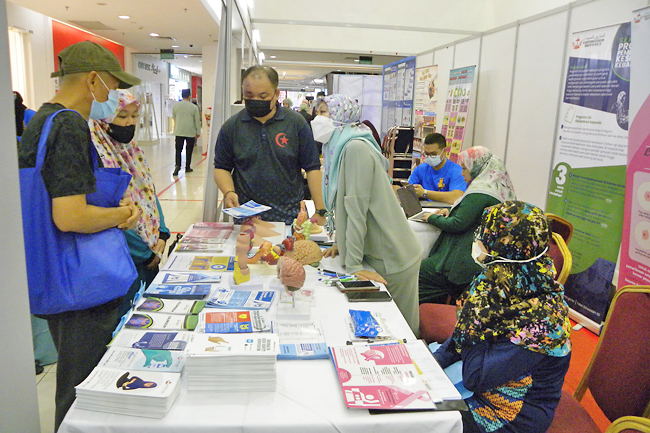Azlan Othman
Islam is a religion that regulates all aspects of human life, including health, which is absolute in carrying out the activities of human life, according to Religious Teachers University College of Seri Begawan (KUPU SB) Director of International and Public Relations Pengiran Siti Katijah binti Pengiran Sulaiman.
Speaking at the Islamic Health Education Roadshow 2022, Pengiran Siti Katijah said that when the human body is in a healthy state, they can perform worship activities, social activities (mankind’s relationships with each other), as well as worldly activities (mankind’s relationship with nature) well.
She explained that according to the Islamic view, health is divided into three parts, namely physical health, spiritual health (including mental health) and social health.
Physical health refers to the condition of all body parts in carrying out their functions, meaning that there are no disorders or abnormalities in the organs and parts of the body.
Physical health is important in supporting other activities.
This is due to the fact that in Allah the Almighty’s commands, there are many physical activities that require good and strong conditions, such as prayer, ablution, fasting, and other acts of worship.


In the teachings of Islam, these acts of worship have benefits that indirectly provide positive effects for our bodies who live in accordance with the commands taught in Islam.
For example, prayer is able to stretch the muscles, so that the joints become flexible; and the body’s organs also benefit from the movements of prayer that is done every day.
Ablution according to research can stimulate the nerves in the place where ablution water is applied, and fasting can be healthy especially for the metabolic system by making it become more orderly.
In Islam, taking care of physical health can be done in several ways. First is taking care of Thaharah, which means taking care of the purity and cleanliness of all aspects of life starting from the whole body, food, clothes, place of residence and environment.
Secondly, maintaining nutrition. Islamic teachings always impart that everyone eats good and halal food – halal both in terms of the substance contained in it and the way to get the food. Allah the Almighty commands us to eat halal and good food.
This shows Islam’s appreciation for health, because food is one of the determinants of a person’s health.
Prophet Muhammad (pbuh) taught the right way of eating, including washing hands before eating, eating adequately and not to overeat, eating with the right hand, reciting Bismillah before and Alhamdulillah after eating, and not giving food that is not liked by others.
Third is sports, which is also recommended by Prophet Muhammad (pbuh) to maintain physical health to stay healthy, including swimming, archery, running, and horse riding.
In Islam, health is seen as the most important blessing after faith. But this blessing is often neglected.
Meanwhile, it was highlighted that engaging in leisure activities fulfil the need for physiology and physical growth, expanding psychomotor development.
Leisure activity enhances healthy and balanced body growth, holistic personality development, reduces social ills, promotes harmonious society and to develop the nation through a healthy workforce.
Mental health can be promoted through a friendly smile, always thinking positively, pleasing people, assisting each other, interacting decently, being humble and respecting each other, adhering to regulations, being grateful, patient, hardworking, always giving advice, doing good deeds and prohibiting any wrongdoings.
Mental health is also managed by taking care of our relationship with Allah the Almighty, taking care of ourselves physically and our relations with people around us, and to always self-reflect.
There are also tips for maintaining health through food according to Al-Quran and As-Sunnah, such as avoiding harmful food, not taking haram food and not overeating.
Muslims are urged to eat in moderation, to not condemn disliked food, to wash hands before and after meals, to recite Bismillah before taking food, and to sit while eating and drinking.




